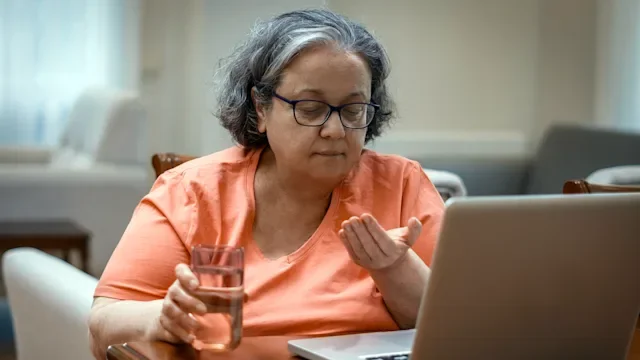Key takeaways:
A geriatrician is a physician who specializes in the care of older adults and their unique health issues.
Many geriatricians are primary care physicians who treat people in a regular clinic. But they can also care for people in special settings like hospitals, nursing facilities, and homes.
Geriatricians are skilled at taking care of people with multiple health issues. Many people see a geriatrician when they need help managing complex medical problems or want to reduce their medications.
As you age, you’re likely to experience new health challenges that are common in older adults. This usually means multiple medical problems that can be tough to manage at the same time. And as these conditions add up, so do the medications needed to treat them. This usually means multiple, competing side effects and increased potential for drug interactions. And the social issues at home can become increasingly complex.
All these things together can be daunting. But as life gets more complicated, there are medical providers who can help. A geriatrician is specifically trained to help older adults and knows how to smooth out and simplify many of these issues. Let’s take a look at how a geriatrician may be able to help you.
What is a geriatrician?
Geriatric medicine refers to the care of older adults — traditionally people who are 65 and older. Geriatricians have a strong foundation in medicine, and they have extra training in common issues in older adults.
Search and compare options
A geriatrician is usually a board-certified internal medicine or family medicine physician who has additional training in geriatric medicine. Most geriatricians complete an additional fellowship training program after completing their residency. They learn more advanced care in medical issues that are common later in life. Examples include:
Alzheimer’s disease and other types of dementia
Management of multiple medications, including stopping or reducing them (polypharmacy and deprescribing medications)
Mobility issues, like falling
Urinary and bowel incontinence
How is a geriatrician different from a primary care physician?
Many geriatricians work as primary care physicians. This means that, in addition to geriatric care, they’ll also oversee the general health of their patients. Like a primary care physician, a geriatrician will stay on top of preventive screening and help manage chronic health conditions.
But a geriatrician often approaches care slightly differently from a typical primary care physician. Geriatricians use a framework known as the “5 Ms”:
Mind: Memory changes are common as you age. A geriatrician will be on special alert for any memory issues and has extra training in the diagnosis of conditions like dementia.
Mobility: Falls are a leading cause of injury in older adults. Geriatricians pay extra attention to risk factors for falls. They may also be more proactive about fall prevention. They can advise you on the best exercise programs and recommend the best walking devices. And they know when to prescribe physical and occupational therapy.
Medications: Geriatricians are trained to recognize medications that may be harmful for older adults. They can help reduce medications or select the safest option or one that has fewer side effects.
Multicomplexity: Many older adults have more than one medical problem. Sometimes one medical issue, or the medication to treat it, can negatively affect another medical problem. Geriatricians are trained to care for people with multiple medical problems while considering all competing factors.
Matters most: Beyond treating medical conditions, geriatricians take special care to learn about your personal health goals. Geriatricians can help you explore your best quality of life as you get older. Based on these conversations, a geriatrician can design a care plan to best meet these goals.
Geriatricians don’t only work as primary care doctors. They can also specialize in conditions that are common among older adults. For example, some geriatricians specialize in conditions such as Alzheimer’s disease and other types of dementia.
Read more like this
Explore these related articles, suggested for readers like you.
Geriatricians can also work in a variety of other care settings. They may do consults in inpatient and outpatient settings. In these situations, they help guide other doctors in the best care for their patients. Examples of other care settings include:
Home visits
Skilled nursing and rehab facilities
Independent and assisted-living senior communities
Memory care facilities
Who should see a geriatrician?
Not every older adult needs to see a geriatrician. In fact, research suggests that only about 30% of adults 65 and older really need one. And that’s good news, because there are relatively few geriatricians in the U.S. compared to the number of older adults.
Many primary care providers are taking excellent care of people who are older than 65. And even without formal training in geriatrics, they have a lot of experience and knowledge about the unique care for older adults.
You or a loved may benefit from seeing a geriatrician if:
You feel there’s not enough time during medical appointments to address all of your questions and concerns.
You feel like you’re taking too many medications.
You’re having trouble with side effects from medications.
You have multiple, complicated medical issues.
You have frequent visits to the hospital or emergency room.
You have concerns about your memory or risk for dementia.
What are the benefits of seeing a geriatrician?
Geriatricians are trained to consider both the medical and social issues that can affect the health of older adults. So their approach can provide many benefits for older adults and their caregivers. These benefits include:
More time for discussing complicated health conditions and situations
Recommendations for care facilities and the right level of care
Tips and strategies for improved safety in the home
Coordination of care in the home, such as home-health services
Recommendations for durable medical equipment, such as wheelchairs or walkers
Supportive caregivers and coaching
Discussions about end-of-life-care options, including advance directives and hospice
The bottom line
A geriatrician can help older adults and their family members navigate tricky medical and social situations. The most important thing is that you have a medical provider who listens and gives you the time you need — this is more important than having a provider with a special degree in geriatric medicine.
If you’re considering seeing a geriatrician, talk to your regular provider about your current health concerns. Share any struggles you’re currently experiencing with your medical conditions, medications, or social issues at home. They can help connect you with resources for support and help you decide when getting a geriatrician is the next best step.

Why trust our experts?


References
American Geriatrics Society Expert Panel on the Care of Older Adults with Multimorbidity. (2012). Guiding principles for the care of older adults with multimorbidity: An approach for clinicians. Journal of the American Geriatrics Society.
Molnar, F., et al. (2017). Update: The public launch of the geriatric 5Ms. Journal of the Canadian Geriatrics Society.
Moreland, B., et al. (2020). Trends in nonfatal falls and fall-related injuries among adults aged ≥65 Years — United States, 2012–2018. Morbidity and Mortality Weekly Report.
Rochon, P., et al. (2021). Polypharmacy, inappropriate prescribing, and deprescribing in older people: through a sex and gender lens. The Lancet Healthy Longevity.
U.S. Department of Health and Human Services. (2017). National and regional projections of supply and demand for geriatricians: 2013-2025.
















